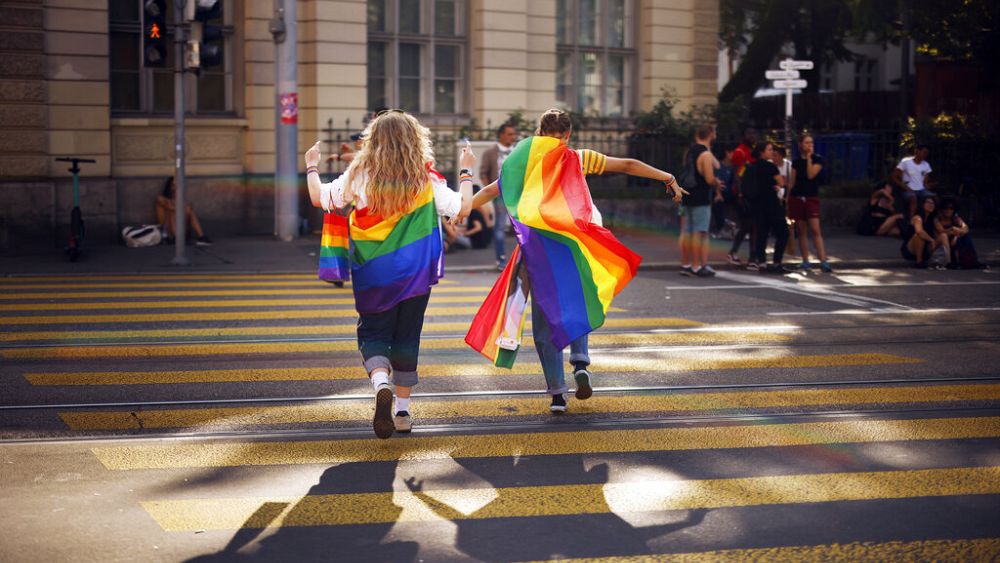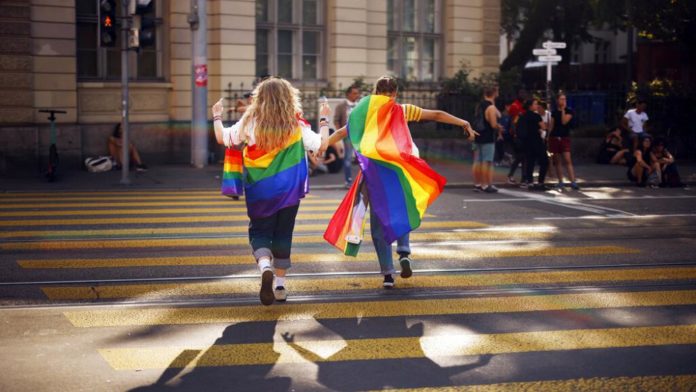
After Swiss voters overwhelmingly backed same-sex marriage in a referendum on Sunday, LGBT groups in the country hailed a “historic day” for Switzerland.
But the Swiss vote also marks a turning point for LGBT rights in Europe: all of Western Europe, except Italy, is now allowing gay and lesbian couples to wed.
Meanwhile, in Central and Eastern Europe, marriage equality continues to face fierce opposition. In many countries, including Poland and Hungary, it is even subjected to a constitutional ban.
“The Swiss vote is really a huge achievement. It’s been a very long process following the tireless efforts of activists over the years and it’s amazing to see how clear the vote was. And of course, such a vote then resonates across borders as well,” said Katrin Hugendubel, Advocacy Director at ILGA-Europe, an LGBT rights group.
“Of course, we do hope that there will be movement in other countries because it’s not only about the institution of marriage being open to everyone — it’s really because it’s such a symbol of full equality and recognition of same-sex love and same-sex couples,” Hugendubel went on.
Has the Swiss vote opened up a new “Iron Curtain” when it comes to LGBT rights in Europe and how much can it influence legislative developments across the continent?
Euronews explores the European implications of the landmark Swiss vote in favour of marriage equality.
Where do European countries stand on same-sex marriage?
Same-sex marriage was first approved in Europe in the Netherlands 20 years ago.
17 countries have since followed suit, including Belgium (2003), Spain (2005), Norway (2009), Sweden (2009), Portugal (2010), Iceland (2010), Denmark (2012), France (2013), the United Kingdom (2013), Luxembourg (2015), Ireland (2015), Finland (2017), Malta (2017), Germany (2017), and Austria (2019).
According to the Council on Foreign Relations, a think-tank, at least 10 countries in Central and Eastern Europe enforce a constitutional ban on gay marriage.
In the case of Croatia, the constitutional ban was voted by referendum in 2013, although the country’s parliament allowed civil partnerships a year later.
Estonia also allows civil unions, while the Czech Republic and Hungary recognise same-sex partnerships.
Even if the European Union does not require member countries to legalise same-sex marriage, the EU’s top court said in a 2018 ruling that the rights of same-sex couples to freedom of movement and residence must be upheld.
In 2015, the European Parliament in a report encouraged the EU and its member states to “reflect on the recognition of same-sex marriage or same-sex civil union as a political, social and human and civil rights issue”. But family laws remains a prerogative of EU countries.
Will the Swiss vote influence Italy, the only western European country still outlawing gay marriage?
Italy is now the only large Western European country where same-sex marriage is not legal, even if civil unions were introduced in 2016.
Francesco Giubilei, a writer and president of the conservative Tatarella Foundation, told Euronews the Swiss vote was unlikely to impact Italian legislation at least in the short run.
“The problem is that this kind of law, in the media and in the political debate, can be very divisive in Italy. There are some parts of society that are in favour of a new law for gay marriage. But there is also another strong part of society that is against this kind of law,” the Italian expert told Euronews.
“There is still a strong power of the Catholic Church in our country,” he explained, “even if it is not as much as in the past.”
Another problem, he said, is “the moment”.
“Currently, the public debate in our country is really focused on COVID-19 and how to spend the money of the EU recovery funds, as well as on the election of the president of the republic next year. So I don’t see an opportunity to discuss this kind of law,” Giubilei told Euronews.
In contrast, Hugendubel told Euronews the Swiss vote could have an “echo” in Italy, considering that “the two countries share a border. They also share to a certain extent, a language.”
“But I think more importantly, we need to see that there is a majority of public opinion in Italy actually saying that LGBTQ people should have equal rights. And that should be the real signal to politicians in Italy.”
According to a 2017 survey by Pew Research Center, roughly 6 in 10 Italians support same-sex marriage.
“There are discussions at the moment in Italy on an anti-discrimination legislation, including sexual orientation and gender identity, that needs to move forward very quickly in order to open up the way for the next steps, also to ensure marriage equality in Italy,” Hugendubel said.
The so-called “Zan bill”— which aims to protect LGBT+ people, women and the disabled from violence and discrimination—was approved by MPs last November. But it has been stalled in Senate for months amid controversies.
Has the Swiss vote opened up a new ‘Iron Curtain’ for LGBT rights in Europe?
Over the past few years, several eastern European countries, notably Hungary and Poland, have been at odds with the European Union over LGBT rights issues.
Hungary recently passed laws that de-facto prohibits adoption for same-sex couples, and ban any content deemed to promote being gay or transgender from being distributed to minors.
The European Commission has taken legal action, arguing the Hungarian legislation runs counter to several EU laws and principles.
And in Poland, the EU withheld grants to a number of Polish cities that had adopted so-called ‘LGBTI-free zones’, or signed discriminatory ‘family rights’ decrees. Many of these regions have now backtracked on their declarations.
Asked if Europe was seeing a new ‘Iron Curtain’ when it came to LGBT rights, Hugendubel was sceptical.
“I think that in general, we should be careful in drawing up those clear lines because the picture is always much more complex,” the activist told Euronews.
“Of course, it is true that progress, especially on marriage equality, has been quicker in the so-called West and that unfortunately, some Eastern European countries even explicitly define marriage as a union between women and men in the constitution and thus actually block an upgrading of civil partnership and registration to marriage equality.”
“We’re fully aware of these problems, but we shouldn’t fall into the trap of thinking that equality has been achieved in the West,” she insisted.
“If we look for example at the rise in hate crimes, it is, unfortunately, a reality of our region. We see it in the UK, we see it in Belgium, we see it in France,” Hugendubel said.
“Some countries in the Balkans explicitly protect intersex people, which some countries in western Europe, like Germany or France and don’t do yet.”
“We don’t have, for example, adoption rights for same-sex couples in Germany yet.”
“So there are many particularities where actually countries can learn from each other and where each country still has to do their homework on the way towards equality for LGBT people.”








